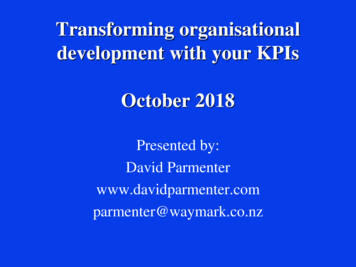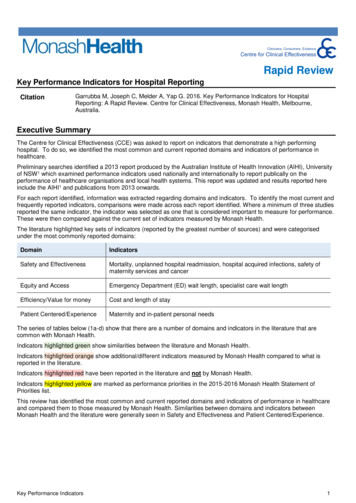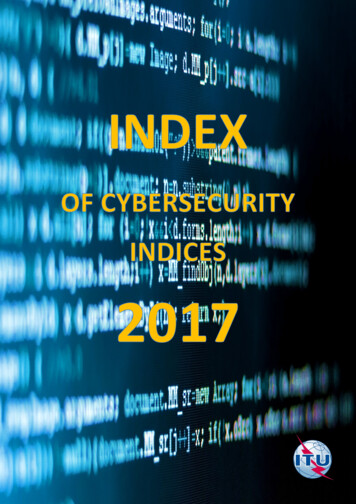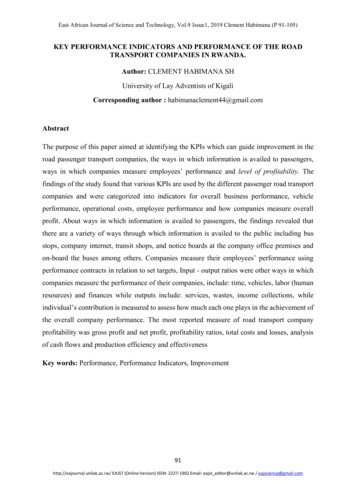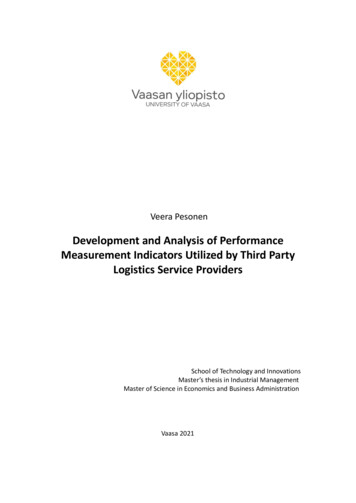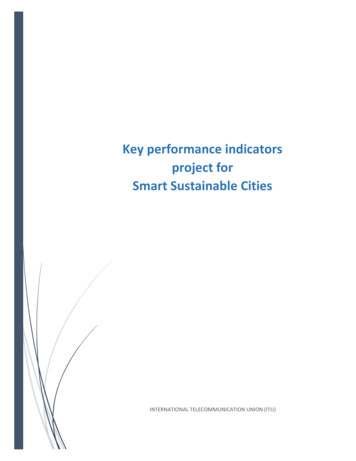
Transcription
Key performance indicatorsproject forSmart Sustainable CitiesINTERNATIONAL TELECOMMUNICATION UNION (ITU)
You must be the change you wish to see in the world.Mahatma Gandhi2
Summary Points on ITU’s work on Smart Sustainable Cities(1) ITU has developed an international definition for smartsustainable cities with UNECE.(2) ITU and UNECE together with CBD, ECLAC, FAO, UNDP,UNECA, UNESCO, UN Environment, UNEP-FI, UNFCCC, UNHabitat, UNIDO, UN-Women, WMO and WTO have alsoformulated an extensive list of KPIs for smart sustainablecities. These KPIs allow cities to assess their own progresswith respect to their smart city goals.ITU has been approached by Dubai, Singapore, Manizales, Montevideo, Buenos Aires, Wuxi,Guangshang, Valencia, Pully, Kairouan and many other cities to pilot these KPIs.Cities that are joining the pilot projects are being asked to provide feedback on the KPIs andconduct a self-assessment which will be further evaluated by ITU.ITU provides the city with a methodology on how to perform the self-assessment using theKPIs. The auditor hired by ITU will develop a verification report based on the data providedby the city.The one year pilot project in each city helps improve the applicability of the existing KPIs andhelps the participating city to determine the extent to which they can be perceived as a smartsustainable city.These pilot projects will facilitate the development of a Global Smart Sustainable City Indexwhich is expected to be finalized in 2017 by ITU within the U4SSC Initiative.The U4SSC serves as a global platform for discussions on smart cities. U4SSC enjoys thesupport of 16 United Nations Agencies. The ITU-UNECE KPIs were reviewed and are nowconsidered UN KPIs as a result of the participation of 16 UN agencies. Cities that participatein the pilot projects are encouraged to participate in the United for Smart Sustainable Cities(U4SSC) initiative and contribute to its deliverables.“It is a truth universallyacknowledged that a(smart) city in possession ofa good ICT infrastructuremust also be sustainable”(3)(4)(5)(6)(7)(8)3
Smart Sustainable City Concept: The ITU ApproachITU commenced its smart city activities through its Focus Group on Smart Sustainable Cities (FGSSC). The FG-SSC concluded with the publishing of 21 Technical Reports and Specifications tofacilitate SSC transitions worldwide. Subsequently ITU also published a flipbook on “Shaping Smarterand more Sustainable Cities”, encompassing all these Specifications and Reports. This flipbook willserve as a comprehensive resource base for ITU’s research on Smart Sustainable Cities.Based on the work conducted within FG-SSC, ITU has also developed an internationally approveddefinition with UNECE (within ITU-T) in October 2015 which reads as follows:“A smart sustainable city is an innovative city that uses information and communicationtechnologies (ICTs) and other means to improve quality of life, efficiency of urban operationand services, and competitiveness, while ensuring that it meets the needs of present andfuture generations with respect to economic, social, environmental as well as culturalaspects”.Soon after the FG-SSC completed its mandate in May 2015, ITU-T has continued its smart cityactivities within ITU-T Study Group 20 (SG20) on “Internet of things (IoT) and smart cities andcommunities (SC&C)”This Study Group is the lead study group on: Internet of things (IoT) and its applications;Smart cities and communities (SC&C), including its e-services and smart services;IoT identification.The work conducted by this Study Group is based on the fact that IoT will connect an estimatednumber of 50 billion devices by the year 2020, impacting nearly every aspect of our daily lives. IoT isalso contributing to the convergence of industry sectors, with utilities, healthcare and transportationamong the many sectors with a stake in the future of IoT. Additionally, IoT also offers both developedand developing countries an opportunity to transform city infrastructure, benefiting from theefficiencies of intelligent buildings and transportation systems, and smart energy and water networksin smart cities.More information on ITU-T SG20 can be found at: 20/Pages/default.aspx.4
Key Performance Indicators for Smart Sustainable CitiesITU understands that building Smart Cities is a complex process, which can be viewed as a long termjourney to success. It is important to be able to measure the performance of various smart sustainablecity ventures. One such approach for measurement is provided by key performance indicators (KPIs)that facilitate the monitoring of the progress achieved in smart sustainable city transitions.Keeping in mind the complexities of smart city transitions, ITU and UNECE together with CBD,ECLAC, FAO, UNDP, UNECA, UNESCO, UN Environment, UNEP-FI, UNFCCC, UN-Habitat, UNIDO,UN-Women, WMO and WTO have also developed a list of KPIs which will allow urban stakeholdersto measure their progress viz. their individual smart city goals and the sustainable developmentgoals (SDGs).City leaders will benefit from these KPIs in terms of strategic planning and measurement of the cityprogress towards their individual smart city goals. The KPIs for SSC aim to assess how the use of ICTshas an impact on the environmental sustainability of cities. The ITU-UNECE's KPIs allow for turningperformance management into performance improvement, by engaging governments, citizens andother stakeholders through multiple channels and empowering them through direct interaction, anddemonstrating accountability through performance reporting.Implementing SSC KPIs also help businesses grow by boosting the performance and consistency ofthe desired outcomes.These KPIs also allow for the demonstration of the feasibility of rapidly progressing towards the setenergy and climate objectives at the city level, while proving to citizens that their quality of life andlocal economies can be improved by consistently measuring energy efficiency and reduction ofcarbon emissions using ICTs.It is desirable that cities can quantify their achievement according to their individual goals. Therefore,by utilizing these indicators, cities as well as their stakeholders can also objectively assess the extentto which the concerned city may be perceived as smart sustainable city and accordingly set theirplans for the future.5
Key Performance Indicators project for Smart SustainableCities to reach the Sustainable Development Goals (SDGs)Expansion of Expertise: Smart City Pilot ProjectsAs a sign of ITU’s growing expertise in the area of Smart Sustainable Cities, ITU has been approachedby leading international cities like Dubai, Singapore, Montevideo, Manizales, Buenos Aires, Valencia,Wuxi and many others to assist with their smart city expeditions. Dubai and Singapore are the world’sfirst cities to assess the efficiency and sustainability of its operations using the key performanceindicators developed by the ITU and UNECE. The one-year pilot projects conducted in each city willevaluate the feasibility of the indicators with the aim of contributing to their x.html#p 1See:The lessons learned and conclusions of the KPIs collection process, assessment and verification foreach of these pilot projects will help streamline the existing KPI and assist other cities which are ona similar smart city trajectory. The inputs from these pilot projects will serve immensely in improvingthe global applicability of these KPIs and developing a Global Smart Sustainable City Index.Phases for each pilot projectEach pilot project is divided into three phases:Phase 1: Assessment and Verification of the KPIs for SSCPhase 2: Contribution to the ITU standardization process on behalf of the cityPhase 3: Establishment of the Global Smart Sustainable Cities IndexPhase 1– Assessment and Verification of the KPIs for SSCThis phase includes the following activities:ITU will provide the city with an excel template which contains all the KPIs to be assessed.The city will fill in the template with the information received from the different entities.Once the information is provided to ITU, the auditor will verify the data provided by the city.Once the audit process has been completed, the auditor will provide an extensive report,which includes the following information: Audit results Initial policy recommendations Improvement opportunitiesIn case the city requires any assistance during the data collection process, ITU/TSB will provide anyclarification on the KPIs. Additionally, conference calls could be organized if needed. 6
Phase 2 - Contribution to the ITU standardization process on behalf of the cityBased on the results of the audit, the participating city is invited to provide suggestions on the KPIsto the Advisory Board for smart sustainable cities within the U4SSC. By participating in ITU’s pilotproject, the city will again automatic membership of the Advisory Board.Phase 3 – Establishment of the Global Smart Sustainable Cities index.All the cities involved in the project will participate in the establishment of the Global SmartSustainable Cities index within the U4SSC. Furthermore, each city will receive a certificate from ITU,testifying that they were successfully evaluated based on an international standard.Terms and Conditions to be implemented each pilot projectQualifying attributes of participating city The concerned city should have a keen interest in transitioning to a smart and sustainablecity.Each city wishing to participate in ITU’s smart city pilot project should send an official letterrequesting participation in the pilot project to the Telecommunication StandardizationBureau (TSB) Director, Dr Chaesub Lee (chaesub.lee@itu.int, cc tsbdir@itu.int) Cities are alsorequired to send a copy to this letter to the project head, Ms Cristina Bueti(cristina.bueti@itu.int).The participating city should commit to completing the pilot project once the processes andphases have been initiated.The participating city should commit to contributing their inputs and lessons learnt from thepilot project for the establishment of the Global Smart Sustainable City Index.Responsibilities of each participating city The participating city is required to collect and record the required information in the excelsheet provided by ITU to initiate the verification process by the auditor. Each city will be given3-6 months to gather the data. The final date for submission of the data will be decided inagreement with the city and the auditor.Each city may decide whether they wish to have the audit conducted onsite or remotely.Participating in the pilot project is self-funded by the concerned city.The participating city is required to provide the travel (in Business Class) and accommodationexpenses for the mission to the site for 1 consultant (designated by ITU). These expenses arenot included in the overall cost of the pilot project for the city.Responsibilities assumed by ITU ITU is tasked with ensuring that each participating city is well informed about the processesconducted during the pilot projects.ITU is responsible for appointing a competent and accomplished consultant who can carryout the verification process.7
ITU is responsible for deciding on a suitable staff member who can supervise the verificationwork carried out by the auditor.Associated Cost(s) To ensure transparency in the process, ITU will hire an external consultant (auditor).To learn more about the associated costs of this project please contact the Secretariat at:u4ssc@itu.intAs a part of the verification process, the auditor will conduct a series of interviews and willproduce a final verification report.Additional Information Ms Cristina Bueti (ITU) will be in charge of monitoring the overall functioning and progressof each pilot project.Each pilot project will be carried out within one year, unless decided otherwise by theparticipating cities and ITU.The smart city pilot project will be conducted based on the revised version ofRecommendation ITU-T Y.4903/L.1603 Key performance indicators for smart sustainablecities to assess the achievement of sustainable development goals. This ITU-TRecommendation was refined based on the inputs of 16 UN agencies, internationalorganizations and cities.ITU cannot be held responsible for any last minute changes to smart city pilot projectschedule or process.The verification report of each city will only be published at the discretion of the participatingcity.Consultants and ITU staff members involved in the pilot projects are required to keep all theinformation associated with the pilot project confidential.All the material published based on the pilot projects will be the intellectual property of theparticipating city and ITU.8
Key Performance Indicators for Smart Sustainable Cities ITU understands that building Smart Cities is a complex process, which can be viewed as a long term journey to success. It is important to be able to measure the performance of various smart sustainable city ventures.

